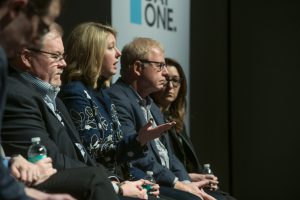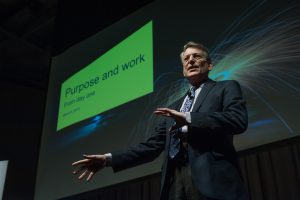Translating Corporate Values into Social Impact—and Deeper Employee Relationships


We live in an era when trust is under strain. The prevalence of ideological polarization, economic instability and uncertainty over the reliability of news reporting has tested the bonds that underpin society. As people’s faith wanes in traditional societal institutions—not to mention social media—they are turning elsewhere for trustworthy guidance. And according to a global survey released in January, the Edelman Trust Barometer, a leading beneficiary of that reallocated trust is “My employer.”
That shift has weighty implications for leaders who sense both the opportunity and responsibility of an era when corporate values will increasingly set the tone for broader societal values. What’s more, it’s unlikely to be a blip.
“Every trend line that we see [suggests] that this is going to be even more important as we look at the future,” says Seth Green, founding director of the social enterprise-focused Baumhart Center at Loyola University Chicago. This week, Green moderated a panel at the From Day One conference in Chicago, focused on how organizations can lead by establishing strong values and following through on them.
Here are three steps organizations can take to ensure that they’re worthy of the trust employees are placing in them, according to the panelists:
Be Trustworthy
Green and his panelists agreed that for employers, the key to making of the most of the trust placed in them is, well, to be trustworthy. That means not only outlining a collection of noble corporate values, but taking care to live them out.
“I’m being tested every day in terms of my decisions, my behaviors, my attitude,” says Howard Sherman, CEO of Good360, an Alexandria, Virginia-based nonprofit that distributes excess inventory from retailers to charitable organizations. Specifically, Sherman pointed to flashpoint moments such as decisions that may put the short-term interests of the executive at odds with the company’s long-term interests.
“You get a chance each and every day, particularly when you're leading an organization, to increase the level of trust between you and an organization. But man, if I just trip up—and nobody's perfect—it is so, so hard to get it back,” he said.

Reciprocate Your Employees’ Trust
Just as with interpersonal relationships, organizations do well to remember that trust is a two-way street, said Bob Dixon, head of sustainability for Siemens. Dixon said that when Siemens changed its policy for expense reimbursements to one that placed more trust in employees, the change was palpable.
Even though the process tweak was minor, “it was so profound to a lot of people, because it was like, ‘They trust me, and I trust them,’” said Dixon. “It starts building mutual trust. A lot of times I think we say we want our employees to trust us but we don’t really trust them. And so that's what I encourage people to do, is figure out how to trust your employees—allowing them to talk, to use social media, to make decisions.”
Demonstrate Commitment to Social Good
The notion of the triple-win—the idea that a smart business practice can benefit your company, its customers and also deliver a social or economic benefit—is a popular one, but of course easier to dream about than to achieve. Yet this “mutualism,” not traditional altruism, is the future of corporate philanthropy, according to Good360’s Sherman. Taking the time to find these opportunities and capitalize on them conveys your organization’s commitment as well as its creativity.
What’s more, the identification and pursuit of these opportunities can help deepen the relationship between you and your employees. “We get this alignment of personal purpose with organizational purpose,” says Jon Powell, executive director of the People Advisory Services group at consultancy EY, who spoke at the conference later in the day. “It’s part of how we establish resonance.”
Here are three examples from widely divergent industries where business leaders were able to deliver triple-wins:
Best Buy Teen Tech Centers. Electronics retailer Best Buy operates training programs in underserved communities aimed at preparing students for careers in technology. There’s a social benefit there, sure, but it’s not just charity.
“We're looking at those not just to help teens from underserved neighborhoods get access to tech and tech education, but as a talent pipeline for us and for our partners,” said Andrea Wood, Best Buy’s head of social impact. “That's where you have the greatest impact, [by preparing someone for a job] and not just by cutting a check.”
Univision Chicago’s Christmas party coverage. When TV station Univision Chicago was approached about covering a Christmas party for families at a struggling urban school last December, the station not only covered the event but recruited a corporate sponsor to make the event even more special. It was an unconventional move for a news organization, but one that made Christmas brighter for the families in question.

“A lot of trust can come as a result of finding that intersection [of interests] without pretending that we’re too disconnected from reality,” says Teri Arvesu, VP of content for Univision Chicago.
Abbott’s decentralized healthcare initiative. Healthcare manufacturer Abbott is investigating whether its diagnostic tools can be used in remote African areas, far from the big-city hospitals where the devices were intended for use. “If we can get access closer to people who live in very rural, hard-to-reach, low-income parts of the world, and if we can actually raise the standard of care that they have access to—and we’re able to sell a product at the same time—that’s a win-win. And there's an incredible business case for that,” says Jenna Daugherty, divisional VP for social responsibility at Abbott.
Employers increasingly find themselves in a strange role, not only as providers and creators, but as a trusted anchor in a turbulent time. When they prove worthy of that trust, both their organizations and employees benefit—and, often, so does society.
Steve Hendershot is a multimedia journalist in Chicago. He writes about technology and entrepreneurship for Crain’s Chicago Business, and also is the author of a bestselling book about the videogame series Street Fighter. Follow him on Twitter at @stevehendershot
The From Day One Newsletter is a monthly roundup of articles, features, and editorials on innovative ways for companies to forge stronger relationships with their employees, customers, and communities.